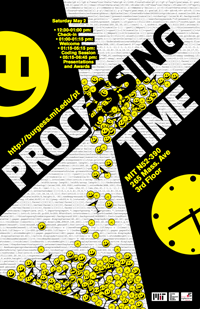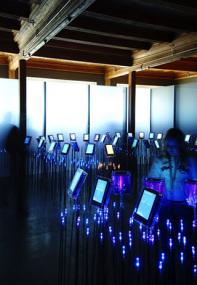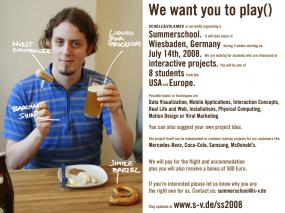Fathom Information Design is looking for developers and designers. Come join us!
We’re looking for people to join us at Fathom. For all the positions, you’ll be creating work like you see on fathom.info, plus more mobile projects (Android, iOS, JavaScript) and the occasional installation piece. If you’re a developer, design skills are a plus. Or if you’re a designer, same goes for coding.
- Developer – Looking for someone with a strong background in Java, and some C/C++ as well. On Monday this person would be sorting out more advanced aspects of a client project. On Tuesday they would hone the Processing Development Environment, mercilessly crushing bugs. On Wednesday they would refactor critical visualization tools used by brilliant scientists. On Thursday they could put out a fire in another client project without breaking a sweat, and on the fifth day, they would choose what we’re having for Beer Friday. This messiah also might not mind being referred to in the third person.
- Web Developer – In 1996, I used Java for my Computer Graphics 2 homework at Carnegie Mellon. I’ll never forget the look on the face of my professor Paul Heckbert (Graphics Gems IV, Pixar, and now Gigapan — a man who wrote an actual ray tracer in C code that fit on the back of a business card), when he asked me during office hours why this was a good idea. Your professor did the same thing when you told him (or her) that you’d be implementing your final project with JavaScript and Canvas. We need amazing things to happen with HTML, CSS, and JavaScript, and you’re the person to do it.
- Junior Designer – You’ve finished your undergrad design program and feel the need to make beautiful things. Your commute is spent fixing the typography in dreadful subway ads (only in your head, please). You are capable of pixel-level detail work to get mobile apps or a web site just right. And if we’re lucky, you’re so good with color that you’ve been mistaken for an impressionist painter.
- Senior Designer – So all that stuff above that the Junior Designer candidate thinks they can do? You can actually do it. And more important, you have the patience and humility to teach it to others around you. You’re also an asset on group projects, best friends with developers, and adored by clients.
At the moment, we’re only looking for people located in (or willing to relocate to) the Boston area.
Please send résumé or CV, links to relevant work, and cover letter to inquire (at) fathom (dot) info. Please do not write us individually, as that may void your contest entry.
John Maeda put us in touch with Aaron Perry-Zucker, who writes:
I created Design for Obama and saw what a fully engaged, passionate, creative community can do. On that occasion, we were eager to lend our creative talents to a movement calling for change and inspire others to do the same.
Today we face a much graver task: In the wake of the unimaginable suffering that has befallen the island of Haiti, it is our job as artists and designers to use our talents to call for advocacy and understanding. Thanks to Design for Obama artist, James Nesbitt, we are now operating from designforhaiti.com.
Consider this a creative call to action to design:
Both are necessary; this is what artists and designers do best. Let us come together and lead the way to relief.
— Aaron Perry-Zucker
Back in December, I made the decision to leave Seed and strike out on my own. As of January 1st (two weeks ago), I’m setting up shop in Cambridge. (That’s the fake Cambridge for you UK readers. Or, Cambridge like “MIT and Harvard” not “University Of”).
The federal government knows this new venture under the charmingly creative moniker of BEN FRY LLC, but with any luck, a proper name will be found soon so that I don’t have to introduce myself as Ben Fry, founder of Ben Fry LLC. (Which is even worse than having a site with your own name as the URL. I have Tom White—who originally registered the site as a joke—to thank for that.)
I’ll soon be hiring designers, developers, data people, and peculiar hybrids thereof. If you do the sort of work that you see on this site, please get in touch (send a message to mail at benfry.com). In particular I’d like to find people local to Cambridge/Boston, but because some of this will be project-oriented freelance work, some of it can be done at a distance.
Stay tuned, more to come.
(Update 1/21/2010 – Thanks for the responses. I’m having trouble keeping on top of my inbox so my apologies in advance if you don’t hear back from me promptly.)
 Just heard about this from Casey yesterday:
Just heard about this from Casey yesterday:
Tiny Sketch is an open challenge to artists and programmers to create the most compelling creative work possible with the programming language Processing using 200 characters or less.
…building on the proud traditions of obfuscated code contests and the demo scene. The contest runs through September 13 and is sponsored by Rhizome and OpenProcessing.
Having designed Processing to do one thing or another, several of the submissions made me laugh out loud for ways their authors managed to introduce new quirks. For instance, consider the createFont() function. Usually it looks something like this:
PFont f = createFont("Helvetica", 12);
If the “Helvetica” font is not installed, it silently winds up using a default font. So somebody clever figured out that if you just leave the font name blank, it’s an easy way to get a default font, and not burn several characters of the limit:
PFont f = createFont("", 12);
Another, by Kyle McDonald, throws an exception as a way to produce text to plot on screen. (It’s also a bit of an inside joke—on us, perhaps—because it’s a ubiquitous error message resulting from a change that was made since earlier releases of Processing.)
One of the most interesting bits is seeing how these ideas propagate into later sketches that are produced. Since the font hack appeared (not sure who did it first, let me know if you do), everyone else is now using that method for producing text. Obviously art/design/coding projects are always the result of other influences, but it’s rare that you get to see ideas exchanged in such a direct fashion.
And judging from some of the jagged edges in the submissions, I’m gonna change the smooth() to just s() for the next release of Processing, so that more people will use it in the next competition.
 Spend your Saturday making clocks with code:
Spend your Saturday making clocks with code:
Processing Time
A code jam / party and programming competition
Part of the Boston Cyberarts Festival
Saturday, May 2, 2009 – MIT N52–390
265 Massachusetts Ave, 3rd Floor
Concept
- Compete individually or in pairs to design and develop beautiful programs in Processing
- Snack and refresh yourself
- Present completed projects to other participants and visitors at the end of the day
- Anyone (not just MIT students or community members) can compete, anyone can stop by to see presentations
- Meet the creators of Processing, Ben Fry (in person) and Casey Reas (via video), who will award prizes
Schedule
- 12:30-01:00 pm: Check in
- 01:00-01:15 pm: Welcome
- 01:15-05:15 pm: Coding Session
- 05:15-06:45 pm: Presentations and Awards – Public welcome!
Registration
Register in advance, individually or in two-person teams, by emailing processing-time@mit.edu with one or two participant names and a team name.
Festival
Processing Time is sponsored by MIT (Arts Initiatives at MIT, Center for Advanced Visual Studies, Program in Writing & Humanistic Studies) and is part of the Boston Cyberarts Festival.
The Processing Time page, linked to a nifty poster, is at: burgess.mit.edu/pt
Passing along a call for the ACM Creativity & Cognition 2009. Sadly I’m overbooked and won’t be able to participate this year, but I attended in 2007 and found it a much more personal alternative to the more enormous ACM conferences (CHI, SIGGRAPH) without losing quality.
Everyday Creativity: Shared Languages and Collective Action
October 27-30, 2009, Berkeley Art Museum, CA, USA
Sponsored by ACM SIGCHI, in co-operation with SIGMM/ SIGART [pending approval]
Keynote Speakers
Mihaly Csikszentmihalyi
Professor of Psychology & Management, Claremont Graduate University, USA
JoAnn Kuchera-Morin
Director, Allosphere Research Laboratory, California Nanosystems Institute, USA
Jane Prophet
Professor of Interdisciplinary Computing, Goldsmiths University of London, UK
Call for Participation
Full Papers, Art Exhibition, Live Performances, Demonstrations, Posters, Workshops, Tutorials, Graduate Symposium
Submission deadline: April 24, 2009
For more information and submission process see: www.creativityandcognition09.org
 Creativity is present in all we do. The 7th Creativity and Cognition Conference (CC09) embraces the broad theme of Everyday Creativity. This year the conference will be held at the Berkeley Art Museum (CA, USA), and asks: How do we enable everyone to enjoy their creative potential? How do our creative activities differ? What do they have in common? What languages can we use to talk to each other? How do shared languages support collective action? How can we incubate innovation? How do we enrich the creative experience? What encourages participation in everyday creativity?
Creativity is present in all we do. The 7th Creativity and Cognition Conference (CC09) embraces the broad theme of Everyday Creativity. This year the conference will be held at the Berkeley Art Museum (CA, USA), and asks: How do we enable everyone to enjoy their creative potential? How do our creative activities differ? What do they have in common? What languages can we use to talk to each other? How do shared languages support collective action? How can we incubate innovation? How do we enrich the creative experience? What encourages participation in everyday creativity?
The Creativity and Cognition Conference series started in 1993 and is sponsored by ACM SIGCHI. The conference provides a forum for lively interdisciplinary debate exploring methods and tools to support creativity at the intersection of art and technology. We welcome submissions from academics and practitioners, makers and scientists, artists and theoreticians. This year’s broad theme of Everyday Creativity reflects the new forms of creativity emerging in everyday life, and includes topics of:
- Collective creativity and creative communities
- Shared languages and Participatory creativity
- Incubating creativity and supporting Innovation
- DIY and folk creativity
- Democratising creativity
- New materials for creativity
- Enriching the collaborative experience
We welcome the following forms of submission:
- Empirical evaluations by quantitative and qualitative methods
- In-depth case studies and ethnographic analyses
- Reflective and theoretical accounts of individual and collaborative practice
- Principles of interaction design and requirements for creativity support tools
- Educational and training methods
- Interdisciplinary methods, and models of creativity and collaboration
- Analyses of the role of technology in supporting everyday creativity
The Berkeley Art Museum should be a great venue too.
James Torget, by way of my inbox:
I wanted to touch base to let you know about a workshop that we’re putting together out here at the University of Richmond. Basically, UR (with James Madison University) will be hosting a workshop this spring focused on how scholars can create visualizations of historical data and how we can better share our data across the Internet. To that end, we are looking for people working on these questions who would be interested in participating in an NEH-sponsored workshop.
We are seeking proposals for presentations at the workshop, and participants for our in-depth discussions. The workshop is scheduled for February 20-21, 2009 at the University of Richmond. We are asking that people submit their proposals by December 15, and we will extend invitations for participation by December 31, 2008. Detailed information can be found at: http://dsl.richmond.edu/workshop/
 My friends down the street at Small Design Firm (started by Media Lab alum and namesake David Small) are looking for a programmer-designer type:
My friends down the street at Small Design Firm (started by Media Lab alum and namesake David Small) are looking for a programmer-designer type:
Small Design Firm is an interactive design studio that specializes in museum exhibits, information design, dynamic typography and interactive art. We write custom graphics software and build unique physical installations and media environments. Currently our clients include the Metropolitan Museum of Art, United States Holocaust Memorial Museum and Maya Lin.
We are looking to hire an individual with computer programming and design/art/architecture skills. Applicants should have a broad skill set that definitely includes C++ programming experience and an interest in the arts. This position is open to individuals with a wide variety of experiences and specialities. Our employees have backgrounds in computer graphics, typography, electrical engineering, architecture, music, and physics.
Responsibilities will be equally varied. You will be programming, designing, writing proposals, working directly with clients, managing content and production, and fabricating prototypes and installations.
Small Design Firm is an energetic and exciting place to work. We are a close-knit community, so we are looking for an outgoing team member who is willing to learn new skills and bring new ideas to the group.
Salary is commensurate with experience and skill set. Benefits include health insurance, SIMPLE IRA, and paid vacation.
Contact john (at) smalldesignfirm.com if you’re interested.

Scholz & Volkmer is running a Summerschool program this July and is looking for eight students from USA and Europe. (Since “summer school” is one word, you may have already guessed that it’s based in Germany.) This is the group behind the SEE Conference that I spoke at in April. (Great conference, and the lectures are online, check ’em out.)
The program is run by their Technical Director (Peter), who is a great guy. They’re looking for topics like data visualization, mobile applications, interaction concepts, etc. and are covering flight and accomodations plus a small stipend during your four week stay. Should be a great time.



 Creativity is present in all we do. The 7th Creativity and Cognition Conference (CC09) embraces the broad theme of Everyday Creativity. This year the conference will be held at the Berkeley Art Museum (CA, USA), and asks: How do we enable everyone to enjoy their creative potential? How do our creative activities differ? What do they have in common? What languages can we use to talk to each other? How do shared languages support collective action? How can we incubate innovation? How do we enrich the creative experience? What encourages participation in everyday creativity?
Creativity is present in all we do. The 7th Creativity and Cognition Conference (CC09) embraces the broad theme of Everyday Creativity. This year the conference will be held at the Berkeley Art Museum (CA, USA), and asks: How do we enable everyone to enjoy their creative potential? How do our creative activities differ? What do they have in common? What languages can we use to talk to each other? How do shared languages support collective action? How can we incubate innovation? How do we enrich the creative experience? What encourages participation in everyday creativity? My friends down the street at
My friends down the street at 
